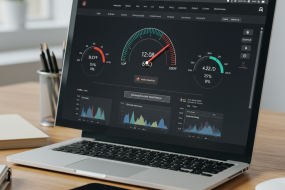Understanding where your website stands in search engine results can make or break your digital marketing strategy. An SEO ranking checker is an essential tool that reveals how your pages perform for specific keywords, giving you the data needed to optimize your content and outrank competitors.
What is an SEO Ranking Checker?

An SEO ranking checker is a tool that monitors and reports your website’s position in search engine results pages (SERPs) for specific keywords. These tools track your rankings across different search engines, locations, and devices, providing valuable insights into your SEO performance.
Unlike manually searching for your keywords (which can be inaccurate due to personalized results), ranking checkers provide objective data about where your pages actually appear in search results. This information helps you understand which keywords are driving traffic, identify optimization opportunities, and measure the success of your SEO efforts.
Why SEO Ranking Tracking Matters
Measure Campaign Effectiveness
Without tracking your rankings, you’re essentially flying blind. Ranking checkers allow you to see which SEO strategies are working and which need adjustment. You can correlate ranking improvements with traffic increases and ultimately tie your efforts to business results.
Identify Opportunities
Ranking data reveals keywords where you’re close to breaking into the first page or top three results. These represent low-hanging fruit where small improvements could yield significant traffic gains.
Monitor Competitor Performance
Most ranking checkers show competitor positions alongside your own rankings. This intelligence helps you understand the competitive landscape and identify gaps in your strategy.
Track Progress Over Time
SEO is a long-term game. Ranking checkers maintain historical data, allowing you to spot trends, seasonal fluctuations, and the impact of algorithm updates on your visibility.
Key Features to Look for in Ranking Checkers
Accurate and Fresh Data
Choose tools that update rankings frequently and provide accurate results. Some tools update daily, while others may only refresh weekly. Consider your needs and budget when evaluating update frequency.
Local and Mobile Tracking
Search results vary significantly by location and device. Ensure your chosen tool can track rankings for your target geographic areas and across desktop and mobile devices.
Keyword Grouping and Organization
As your keyword portfolio grows, organization becomes crucial. Look for tools that allow you to group keywords by topic, campaign, or business objective.
Historical Data and Reporting
Robust reporting features help you identify patterns and communicate results to stakeholders. Visual charts and automated reports save time and provide clear insights.
Competitor Tracking
The ability to monitor competitor rankings for the same keywords provides valuable context for your performance and helps identify new opportunities.
Popular SEO Ranking Checker Tools
Free Options
Google Search Console provides basic ranking data directly from Google. While limited in features, it offers reliable information about your site’s performance and is essential for any SEO toolkit.
SERPWatcher offers a free tier with limited keyword tracking, making it suitable for small websites or those just starting with rank tracking.
Premium Solutions
SEMrush combines ranking tracking with comprehensive SEO analysis, keyword research, and competitor intelligence. Its position tracking tool provides detailed insights and integrates well with other SEO workflows.
Ahrefs offers powerful ranking tracking alongside its popular backlink analysis features. The tool provides accurate data and excellent visualization of ranking trends.
Moz Pro includes rank tracking as part of its all-in-one SEO platform, with user-friendly reporting and integration with other Moz tools.
How to Set Up Effective Rank Tracking
Choose the Right Keywords
Focus on keywords that matter to your business. Include a mix of:
- Primary target keywords for your most important pages
- Long-tail keywords that drive qualified traffic
- Competitor keywords where you want to gain market share
- Brand terms to monitor your branded search presence
Configure Location and Device Settings
Set up tracking for locations where your customers are located. If you serve local markets, track city or regional results. For mobile-first businesses, prioritize mobile ranking data.
Establish Baseline Measurements
Document your starting positions before implementing new SEO strategies. This baseline helps you measure the true impact of your optimization efforts.
Set Up Regular Monitoring
Establish a routine for reviewing ranking data. Weekly reviews work well for most businesses, allowing you to spot trends without getting caught up in daily fluctuations.
Interpreting Your Ranking Data
Understanding Fluctuations
Search rankings naturally fluctuate due to algorithm updates, competitor actions, and seasonal trends. Focus on longer-term patterns rather than day-to-day changes.
Identifying Patterns
Look for correlations between ranking changes and your SEO activities. Did rankings improve after you updated content or gained new backlinks? This helps you understand what strategies work best for your site.
Prioritizing Action Items
Use ranking data to prioritize your SEO efforts. Keywords ranking on page two (positions 11-20) often present the best opportunities for quick wins with targeted optimization.
Common Ranking Checker Mistakes to Avoid
Tracking Too Many Keywords
Starting with hundreds of keywords can be overwhelming and expensive. Begin with 20-50 of your most important keywords and expand gradually.
Ignoring Search Intent
Rankings mean little if you’re targeting keywords that don’t match user intent. Ensure your tracked keywords align with what your target audience actually searches for.
Focusing Only on Rankings

Rankings are a means to an end, not the end goal itself. Always connect ranking performance to traffic, conversions, and business outcomes.
Not Accounting for Personalization
Search results can vary based on user location, search history, and other factors. Use your ranking checker’s data rather than manual searches to get accurate, depersonalized results.
Maximizing Your SEO Success with Ranking Data
Regular rank tracking transforms your SEO efforts from guesswork into data-driven strategy. By monitoring your positions, identifying opportunities, and tracking progress over time, you can make informed decisions that improve your search visibility and drive more qualified traffic to your website.
Start by selecting a ranking checker that fits your needs and budget, then focus on tracking keywords that truly matter to your business. Use the insights you gain to refine your content strategy, identify new opportunities, and stay ahead of your competition.
Remember that SEO success comes from consistent effort and continuous improvement. Your ranking checker is the compass that guides your journey, helping you navigate the complex world of search engine optimization with confidence and clarity.


















No Comments